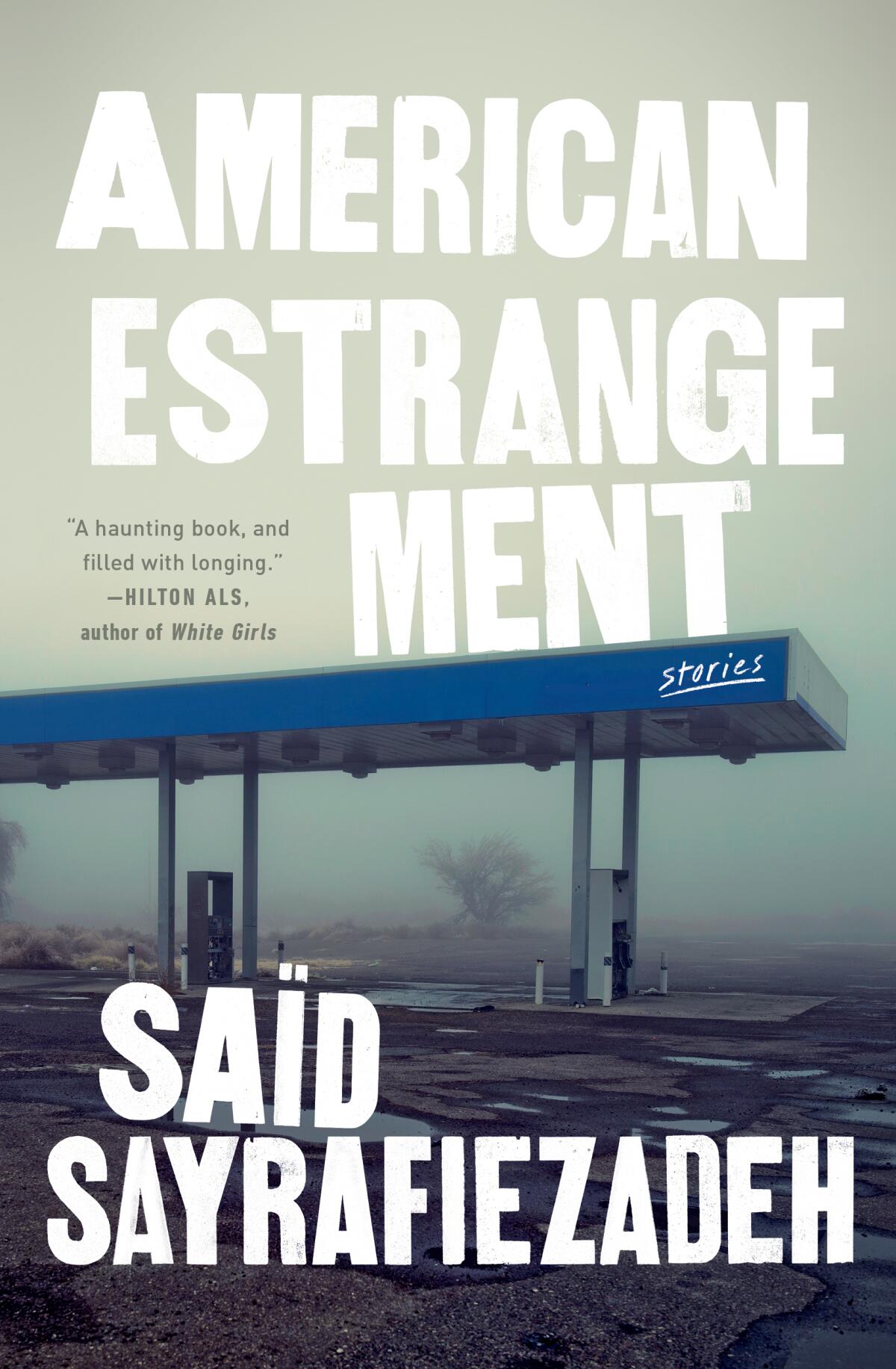Review: In ‘American Estrangement,’ dark stories about the dystopias inside us all

On the Shelf
American Estrangement
By Saïd Sayrafiezadeh
Norton: 192 pages, $26
If you buy books linked on our site, The Times may earn a commission from Bookshop.org, whose fees support independent bookstores.
Could there be a more spot-on title for Saïd Sayrafiezadeh’s second collection of short fiction than “American Estrangement”? All seven of the stories here grow out of an America gone menacing and strange. Some portray a country that is through the looking glass, others a culture still recognizably our own. And yet, that still is a key modifier because in Sayrafiezadeh’s work, everything is bad and getting worse.
“We were in a venue used for high school football games, and a banner hung breezeless in the air, celebrating a championship from twenty years ago,” notes the narrator of “Fairground.” “Next to the banner was a portrait of the mayor, appearing magnanimous and forward-thinking. He’d won by promising that he could do what needed to be done to remedy the persistent problems of the city: plumbing, mail delivery, etc. Also the secured populations. No one could argue that these were problems. No one as yet had been able to figure out how to fix them.”
The characters in “Fairground” eat at Applebee’s and live above a nail salon. Yet their (unnamed) city has been rezoned into “Sectors,” and on occasion, the narrator confides, “when I was out walking with my mom, we would pass a row of school buses lined up like ducks at the crosswalk, waiting for the light to turn green, the faces of the secured populations looking through the windows with indifference and resignation.”
These people are never identified, but we can well imagine who they are. The poor, the unhoused, the radical. Immigrant and Indigenous communities. The scene, in its mix of the despotic and mundane, recalls “Paranoia,” from Sayrafiezadeh’s 2013 collection “Brief Encounters With the Enemy.” That story’s protagonist moves through a city perpetually on the verge of war; he witnesses military parades and troop movements and trains “loaded with long tubular objects, missiles no doubt.”
‘Something New Under the Sun,’ Alexandra Kleeman’s astounding second novel, features a child star, an eco-cult and a sinister substance called WAT-R.
In “Fairground,” it seems the war is over, or perhaps it never started. Either way, the (r)evolution is complete. The narrator is spending the day with a man who dates his mother; they are at the stadium to witness the public hanging of one of the “secured.” “Don’t feel sorry for him, son,” the older man assures the boy. “That’s the reason the city is in this mess today.”
It’s not hard to identify the social commentary in that dialogue, but Sayrafiezadeh is too nuanced a writer for this to be his sole objective. He is interested in displacement on both the macro and the micro scale.

“The first time I smoked crack cocaine was the spring I worked construction for my father on his new subdivision in Moonlight Heights,” Sayrafiezadeh begins the opening story, “Audition,” narrated by an aspiring actor, “unmatriculated and nineteen.” It’s a fantastic first line, drawing us into both the story and the collection, but it also signals something important about Sayrafiezadeh’s intentions: to juxtapose ambition (or, more accurately, desire) with drift. “Audition” is a narrative less about addiction than about what happens when nothing matters, when we fall out of touch with ourselves.
“My problems were not their problems,” the character observes of his co-workers, although that’s not actually the case. All of them are caught in the same floating existence, where connection is one more unfulfilled desire, not unlike the drugs. “I had expected the foil on my lips to taste like something,” he admits, “but it tasted like nothing. I had expected the smoke to smell like something, but it smelled like nothing. I had expected the high to alter me in some profound and mystifying way, but the effect was underwhelming and anticlimactic. Mostly I felt clear-eyed and levelheaded, disappointingly so.”
Disenchantment marks many of the characters in “American Estrangement,” who are alienated not only from themselves. “Yes, I do know who’s to blame … You’re to blame!” the narrator of “Expedition” screams at his girlfriend Lizzy as they pilot a Cadillac Escalade across an America in which papers are now required to cross state borders, just before they’re pulled over by two men representing the “[c]oncerned citizens of Kansas,” a vigilante group.
Emily St. John Mandel, Susan Orlean, T.C Boyle, Marlon James and others share apocalypse reading picks.
Again, Sayrafiezadeh conflates the political with the personal. “It’s too late for me at forty,” Lizzy laments, referring to the decade she has wasted in a failed relationship. But her focus shifts when the narrator is pulled from the Escalade and muscled “hard up against the hood,” about to be beaten or worse. “What’s wrong with your own state?” the vigilantes demand, and in that moment, we understand, too late, exactly where we are.
This is not an epiphany so much as an inevitability, an instant of clarity that doesn’t yield to grace. Such flashes recur throughout “American Estrangement” — in “A, S, D, F,” for instance, when an assistant at an Aspen art gallery appears to access a buried memory of childhood abuse only to have it fade as fast as it emerges. Or in “Last Meal at Whole Foods,” when another young man takes his dying mother out to dinner, where they watch on television as their city’s beleaguered football team scores touchdown after touchdown in an exhibition game, until “[e]veryone is standing and shouting, everyone including the waitress, including my mother, the diner full of fire and zeal, as if this lone preseason game has any bearing on what’s to come.”
In these stories, neither memory nor love is lasting. Nowhere does this emerge more pointedly than in the collection’s final story, “A Beginner’s Guide to Estrangement,” about an Iranian American named Danny McDade who travels to Tehran to visit the father he’s seen just once since he was 5. Danny is as assimilated as it gets, with a name bestowed by the stepfather who adopted him, but he is in Iran to seek a broader understanding of his identity. With little else in common, he and his father latch onto their one shared experience: a Persian lunch, 15 years earlier, in Buffalo, N.Y.
“He’s laughing,” Danny reports, “and so am I. Here’s the memory that we’ve managed to create, the funny story about a cold afternoon in Buffalo.” Yet Sayrafiezadeh has undercut that sense of resolution by sharing the memory, in detail, earlier in the narrative. The inference is that our stories live inside us first and then we impose them on the world. That’s as true of Danny as of any character in this dark and exhilarating collection, in which even the idea that we might ever come together is one more contrivance, its significance another fabricated illusion.
Annette Gordon-Reed, Ayad Akhtar, Héctor Tobar, Martha Minow, David Kaye and Jonathan Rauch discuss the Jan. 6 riot and what we do about it.
Ulin is a former book editor and book critic of the Times.
More to Read
Sign up for our Book Club newsletter
Get the latest news, events and more from the Los Angeles Times Book Club, and help us get L.A. reading and talking.
You may occasionally receive promotional content from the Los Angeles Times.







